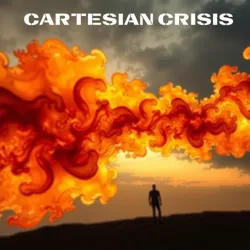Cartesian Crisis

The Cartesian Crisis is a term used to describe a period characterized by the increasing difficulty in distinguishing reality from illusion. This crisis has emerged due to the intertwining of several factors, including the collapse of institutional trust, the pervasive influence of AI-generated realities, and societal shifts that challenge the acceptance of objective truth.
Origins of the Cartesian Crisis
The origins of the Cartesian Crisis can be traced to the early 21st century, a time marked by rapid technological advancements and significant social transformations. Key catalysts include:
- Erosion of Trust: As discussed in Institutional Failures, traditional institutions such as governments, media, and educational bodies faced diminishing credibility. This erosion of trust laid the foundation for the crisis by undermining the bases of objective truth.
- AI-Generated Realities: The rise of advanced artificial intelligence technologies, capable of creating highly realistic simulations and content, has further blurred the lines between what is real and what is artificially constructed. This development plays a crucial role in the ongoing crisis, as detailed in AI-Generated Realities.
- Cultural Rejection of Truth: A societal shift towards skepticism and the rejection of established truths has exacerbated the crisis. This cultural phenomenon, explored in Cultural Rejection of Truth, challenges the acceptance of a shared reality.
Manifestations in Society
The Cartesian Crisis manifests in various aspects of society:
- Media and Information: The proliferation of misinformation and deepfake technology has eroded public confidence in media, leading to fragmented realities and polarized communities.
- Societal Unrest: As explored in Societal Unrest Escalates, the crisis has fueled public dissent and protests, driven by a loss of faith in governmental and institutional authority.
- Privacy vs. Control: The debate over privacy and state control, highlighted in Privacy vs. Control, reflects broader concerns about individual autonomy and the influence of technology on personal freedoms.
Ethical and Philosophical Implications
The Cartesian Crisis raises profound ethical and philosophical questions:
- Authenticity and Reality: What constitutes reality in a world where artificial constructs are indistinguishable from the real? The crisis challenges traditional notions of authenticity and truth.
- Autonomy and Agency: As individuals navigate increasingly complex realities, the crisis prompts discussions about autonomy and the ability to make informed decisions amidst conflicting narratives.
Responses and Adaptations
In response to the Cartesian Crisis, various strategies have been proposed:
- Enhancing Media Literacy: Educating individuals to critically evaluate information and recognize bias and misinformation is crucial for navigating the crisis.
- Technological Solutions: Developing technologies that can verify the authenticity of content and protect against manipulation is essential for restoring trust.
- Dialogue and Engagement: Encouraging open, fact-based discussions to bridge divides and foster mutual understanding is vital for rebuilding social cohesion.
Future Prospects
As the Cartesian Crisis continues to unfold, it presents both challenges and opportunities for societies. The development of innovative governance models, ethical frameworks for technology use, and renewed efforts to build trust will be critical in shaping the future landscape. The balance between reality and illusion will likely define the evolution of social, political, and cultural dynamics in the coming years.
See Also
- Trust in the Digital Age: Explore how trust dynamics have shifted in the digital era, impacting societal interactions.
- Historical Erasure: Learn about the phenomenon of historical revisionism and its role in the crisis.
- Widespread Manipulation Techniques: Discover how techniques such as deepfake technology and misinformation campaigns are leveraged in the modern age.
References
This article is part of a wider exploration into the consequences of the Cartesian Crisis and its impact on modern society. For further insights, see related discussions on Erosion of Trust and Cultural Rejection of Truth.